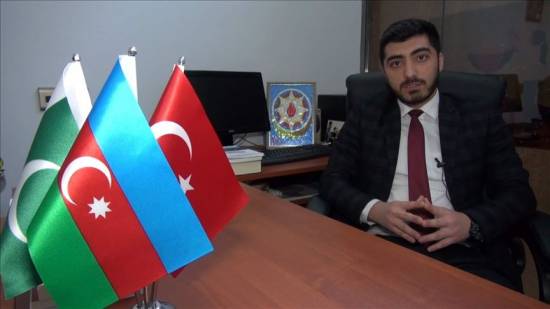ANKARA
The Assembly of World Azerbaijanis on Wednesday condemned the attacks of the Armenian forces on Azerbaijani civilians and military units.
"Along with expelling the occupying Armenian Armed Forces from our historical lands, Azerbaijan is also clearing the South Caucasus region of separatist and terrorist forces," Elshan Yahyayev, the public relations head of a German-based assembly, told Anadolu Agency.
Instead of monitoring the implementation of the violated international law by the Armenian forces, the "external powers" try to keep Azerbaijan under "increasing pressure" from abroad, Yahyayev said.
"Of course, the aim here is to save Armenia, which cannot withstand the victorious army of Azerbaijan," he said, adding that Azerbaijani President Ilham Aliyev "resolutely resists" all these pressures and responds "appropriately" to those who try to influence Azerbaijan by various means.
The military-political leadership of Armenia violates and ignores the norms and principles of international law, Yahyayev added, noting that Azerbaijan has witnessed it again since the clashes erupted on Sept. 27.
He also decried the footage and reports appearing on social media about Armenian children being called and volunteered for the Armenian army.
"By involving young children, the elderly, and women in the war, Armenia's military-political leaders continue their criminal activities and will undoubtedly soon become subjects of the Hague tribunal," Yahyayev said, referring to the International Criminal Court (ICC).
On Sunday, Azerbaijan, with pictures and footage proving the war crime, accused Armenia of using child soldiers in the battle over the occupied Upper Karabakh.
"Video shows that #Armenia employs #childsoldiers. Needs to be investigated. Recruiting and using children under the age of 15 as soldiers is prohibited under international humanitarian law – treaty and custom – and is defined as a #warcrime by ICC," Hikmet Hajiyev, the assistant to the Azerbaijani president, said on Twitter.
Yahyayev stressed that involving children in the battle "grossly" violated Article 38 of the Convention on the Rights of the Child, adopted at the 44th session of the UN General Assembly on Nov. 20, 1989.
"With the blood of hundreds of thousands of people on both sides, Armenia has created an unhappy society that is backward on many sides, out of all international transport and logistics projects, in an economic and geographical siege, and with no prospects for life," he said.
He also underlined that it was "unfortunate" that international organizations turn a blind eye to Armenia's "whims and criminal behavior".
"It is their inaction that drives Armenia to new crimes," Yahyayev also said.
The Assembly of World Azerbaijanis, an international non-governmental organization, was registered in the German judiciary on Sept. 6, 2016. Prior to its registration, the organization functioned as an initiative group.
To date, the Assembly of World Azerbaijanis has been considered the first international public organization of world Azerbaijanis, according to Yahyayev. The assembly is also registered as a lobbying body by the UN Social and Economic Council, the European Commission, and the European Parliament.

Almost 3-decade occupation
Since the clashes erupted on Sept. 27, Armenia has repeatedly attacked Azerbaijani civilians and forces, even violating three humanitarian cease-fires since Oct. 10.
Relations between the two former Soviet republics have been tense since 1991, when the Armenian military occupied Upper Karabakh.
Four UN Security Council resolutions and two from the UN General Assembly, as well as international organizations, demand the "immediate, complete, and unconditional withdrawal of the occupying forces" from the occupied Azerbaijani territory.
In total, about 20% of Azerbaijan's territory – including Nagorno-Karabakh and seven adjacent regions – has been under illegal Armenian occupation for nearly three decades.
The Organization for Security and Co-operation in Europe (OSCE) Minsk Group – co-chaired by France, Russia, and the US – was formed in 1992 to find a peaceful solution to the conflict, but to no avail. A cease-fire, however, was agreed to in 1994.
World powers, including Russia, France, and the US, have called for a sustainable cease-fire. Turkey, meanwhile, has supported Baku's right to self-defense and demanded the withdrawal of Armenia's occupying forces.
Additional Info
- عنوان تمهيدي: Int'l organizations' inaction, blind eye to Armenia's 'whims, criminal behavior' drive it to new crimes, says official


